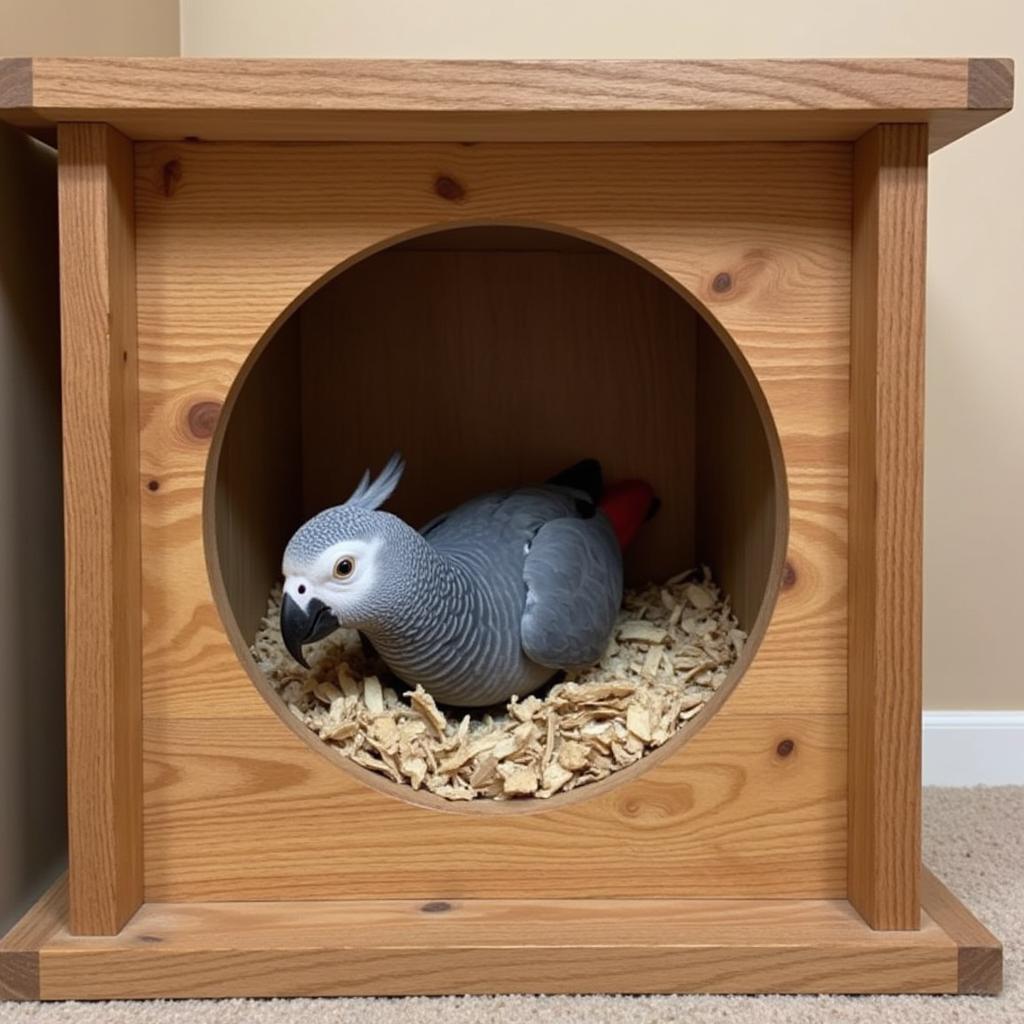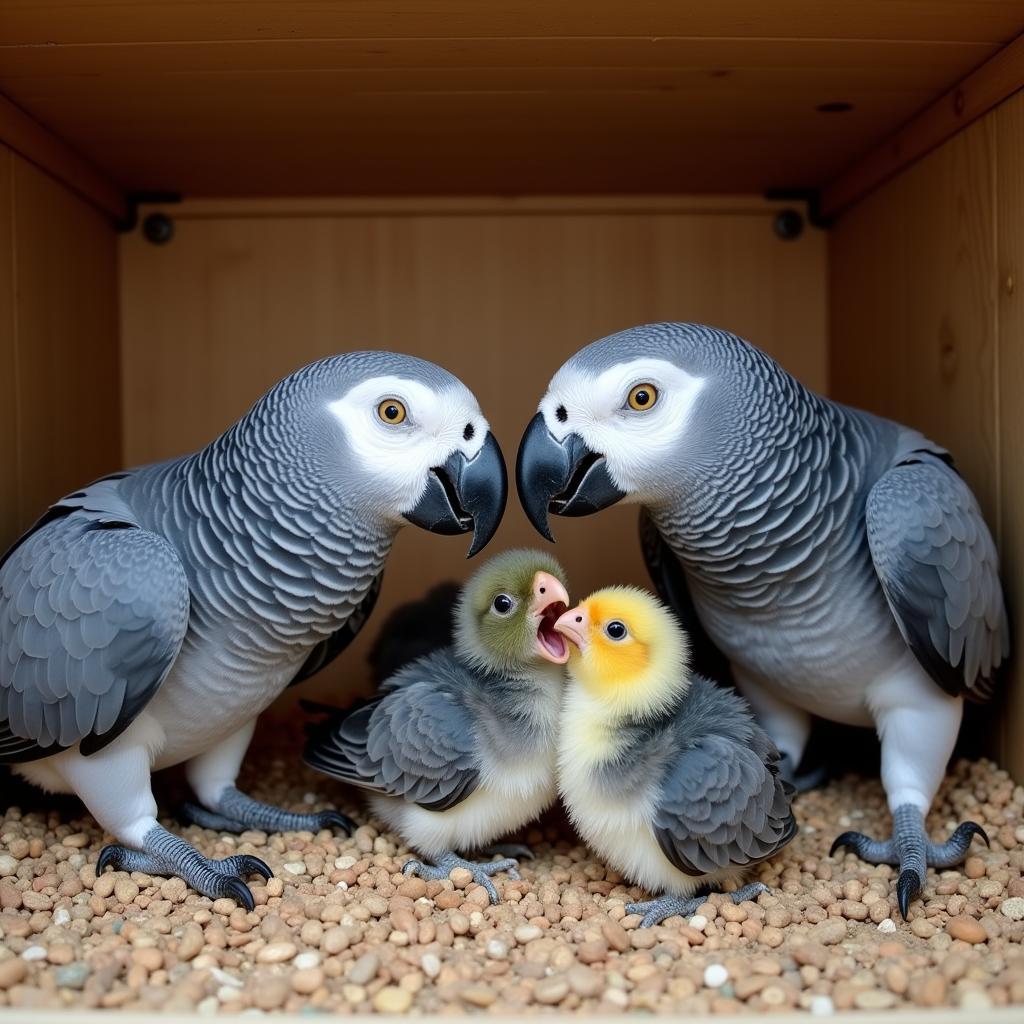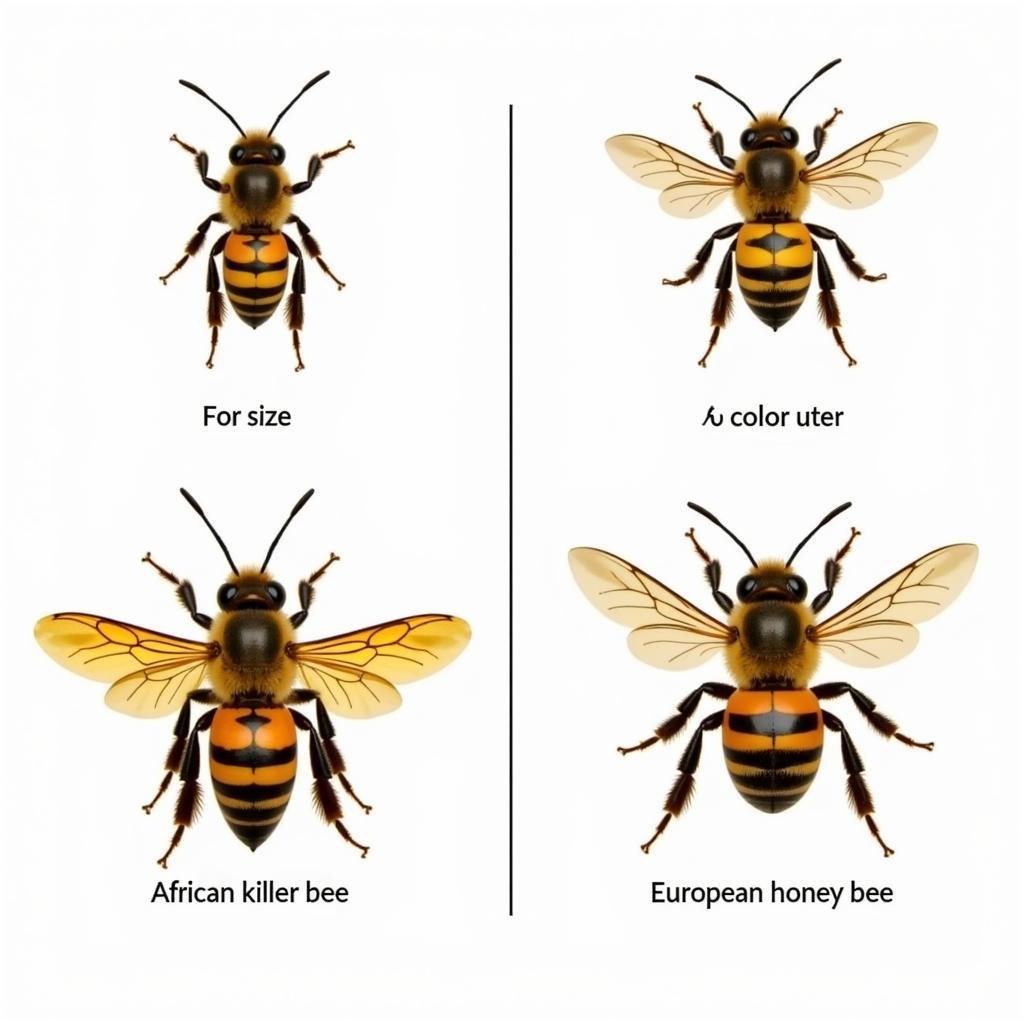African Grey Parrot Mating: A Deep Dive into Breeding Behaviors
African Grey Parrot Mating is a complex and fascinating process, deeply interwoven with their social behaviors and natural instincts. Understanding these intricacies is crucial for anyone considering breeding these intelligent and sensitive birds. This article explores the various aspects of African grey parrot mating, from courtship rituals to nesting habits and chick rearing.
African grey parrots typically reach sexual maturity between 3 and 5 years of age. However, it’s recommended to wait until they are at least 4-5 years old before breeding to ensure they are physically and emotionally mature. Their mating season usually coincides with the rainy season in their native habitat, which provides ample food resources for raising their young. Successful breeding requires careful consideration of their environment, diet, and social interactions. Choosing a compatible pair is the first, and arguably most important, step in the process. Observe your birds for signs of mutual affection, such as preening each other and sharing food. For example, you might notice them performing a unique dance and engaging in what appears to be playful behavior, showcasing their readiness to mate. Learn more about the sounds they make during this period at african grey parrot mating call.
Courtship Rituals and Pair Bonding
The courtship displays of African grey parrots are a sight to behold. Males often perform elaborate dances, bobbing their heads, flapping their wings, and mimicking sounds to attract a female’s attention. Mutual preening and feeding are also crucial elements of their courtship rituals, strengthening the pair bond. These behaviors demonstrate affection and reinforce the connection between the pair. This bond is vital for successful breeding, as both parents play essential roles in raising their chicks.
Recognizing Signs of Readiness to Mate
Identifying when your African grey parrots are ready to mate is key to successful breeding. Look for increased vocalizations, including chattering, whistling, and mimicking sounds. The male might regurgitate food for the female, a clear sign of affection and readiness to mate. Physical changes, such as swollen ceres (the fleshy area above the beak) and increased activity levels, can also indicate breeding readiness. If you notice any of these signs and are curious to compare them to those of other species like Indian ringnecks, check out african grey parrot vs indian ringneck.
Nesting and Egg Laying
Providing a suitable nesting environment is essential for breeding African grey parrots. A large nest box, typically made of wood, filled with soft bedding materials like wood shavings or shredded paper, offers a safe and secure space for the female to lay her eggs. She usually lays 2-5 eggs, with an incubation period of approximately 28-30 days. The female primarily incubates the eggs, while the male provides food and protection. During this time, it’s essential to minimize disturbances and provide a calm and quiet environment. If you’re interested in understanding more about their vocalizations, you can explore african grey parrot noises.
Importance of Diet and Nutrition during Breeding
A nutritious diet is crucial during the breeding season to ensure the health of both the parents and the chicks. Offer a varied diet rich in fruits, vegetables, high-quality parrot pellets, and a calcium supplement. A healthy diet contributes to strong eggshells and healthy chick development. Consult with an avian veterinarian to determine the appropriate dietary requirements for your breeding pair.
 African Grey Parrot Nest Box
African Grey Parrot Nest Box
Chick Rearing and Parental Care
Both parents actively participate in chick rearing, feeding and caring for their young. The chicks are initially helpless and rely entirely on their parents for food and warmth. As they grow, they become more independent and start exploring their surroundings. The parents continue to provide guidance and protection until the chicks are fully fledged and ready to leave the nest. This period of parental care is crucial for the chicks’ development and survival. To learn more about their offspring, consider visiting african grey parrot eggs and babys.
Weaning and Independence
Weaning is a gradual process where the chicks transition from parental feeding to independent eating. This typically starts around 8-12 weeks of age. Encourage independence by providing a variety of foods and allowing the chicks to explore and interact with their environment. Proper weaning is essential for the chicks’ long-term health and well-being. The process is fascinating, as the young birds learn to navigate their world. Understanding their adaptations helps with this stage, as discussed on african grey parrot adaptations.
 African Grey Parrot Parents Feeding Chicks
African Grey Parrot Parents Feeding Chicks
Conclusion
African grey parrot mating is a delicate and intricate process that requires careful attention and understanding. By providing a suitable environment, a nutritious diet, and minimizing disturbances, breeders can contribute to the successful reproduction of these remarkable birds. Understanding the intricacies of African grey parrot mating ensures the well-being of both the parents and their offspring.
FAQs
- When do African grey parrots reach sexual maturity? (Typically between 3 and 5 years of age).
- How many eggs do African grey parrots usually lay? (2-5 eggs).
- What is the incubation period for African grey parrot eggs? (Approximately 28-30 days).
- What is the importance of a nutritious diet during breeding? (Ensures healthy parents and chicks, strong eggshells, and healthy chick development).
- When do African grey parrot chicks start weaning? (Around 8-12 weeks of age).
- How long do African grey parrot parents care for their chicks? (Until they are fully fledged and ready to leave the nest).
- What are some signs of African Grey Parrot mating readiness? (Increased vocalizations, regurgitating food, swollen ceres).
Other Potential Questions
- How to choose a compatible pair of African grey parrots for breeding?
- What are common health issues to watch for during breeding?
- What are the legal requirements for breeding African grey parrots in my area?
- How can I create the ideal breeding environment for African grey parrots?
For further information, explore other articles on our website covering topics such as African grey parrot behavior, diet, and health.
Need Help?
For any assistance regarding African Grey Parrots, feel free to contact us:
Phone: +255768904061
Email: kaka.mag@gmail.com
Address: Mbarali DC Mawindi, Kangaga, Tanzania
Our customer care team is available 24/7.



